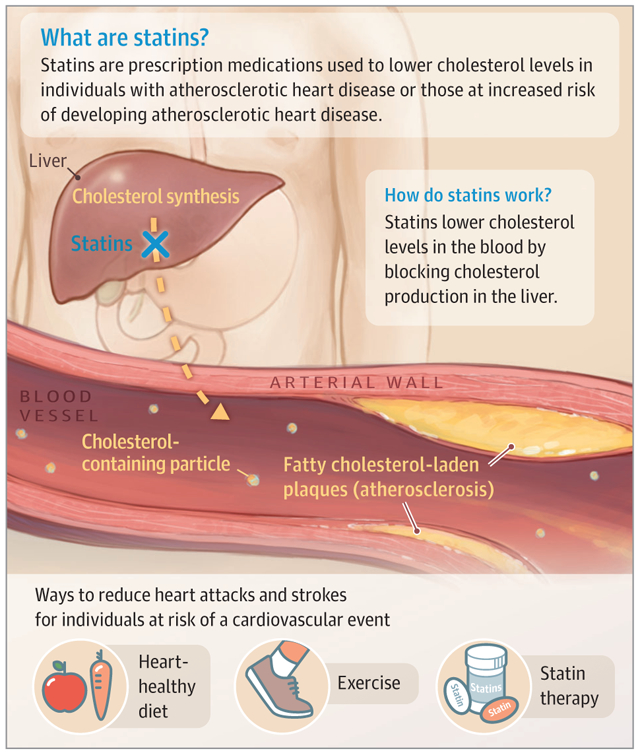Abstract
Atherosclerotic cardiovascular disease (ASCVD) is a leading cause of premature death and disability; statin medications can reduce this risk and prevent heart disease.
Graphical Abstract

How Do Statins Work?
Statin medications are a class of lipid-lowering medications that inhibit a step used by the liver to synthesize cholesterol. Statins reduce the health risks related to atherosclerosis by lowering cholesterol. Atherosclerosis is a cardiovascular disease where fatty cholesterol-laden plaques deposit within the arterial walls of the vascular system affecting the blood flow to vital organs. Statins have proven to be the most effective class of medication for the prevention and treatment of cardiovascular disease.
Can Statins Prevent Heart Disease?
As one of the best-studied medications in randomized clinical trials, statins are proven to extend life and reduce the number of heart attacks and strokes, even among individuals with normal cholesterol levels. Statins are recommended for individuals with known ASCVD. In addition, statins are also recommended for men and women without known heart disease or prior strokes who are at increased risk for developing cardiovascular disease. A heart-healthy diet and exercise are recommended for everyone. Yet, even for individuals who have a healthy lifestyle or who make lifestyle improvements, statins can improve cardiovascular health and prevent heart disease for those at higher risk.
What Are the Potential Adverse Effects and Risks?
Statins are generally safe and well tolerated. The most common reported symptom is of muscle aches or cramps that may occur in 5% of people. Patients can frequently be switched to a different statin or a lower dose that is better tolerated. A small number of individuals may develop diabetes while on statins. The benefits from lowering the risk of death, heart attack, and stroke are likely to outweigh the development of diabetes in those individuals. Serious adverse effects with statins are rare. Women who are pregnant should not take statins because they may be toxic to a developing fetus.
How Should I Decide If a Statin Is Right for Me?
If you have a history of heart disease or stroke, taking a statin medication is recommended, without considering your cholesterol levels. If you do not have any known cardiovascular disease, you or your clinician should calculate your personal 10-year and lifetime risk for a cardiovascular event using a validated risk model available by online calculator or smartphone app. The calculator will integrate your risk factors, age, sex, ethnicity, blood pressure, and cholesterol levels to determine the future risk of a cardiovascular event. If you have a 7.5% risk over the next 10 years, a statin is recommended. If your calculated risk is 5.0% to 7.4% over the next 10 years, statin therapy should be considered. Prior to starting statin therapy you should have a discussion with your physician regarding expected benefits, potential risks, management of other risk factors, monitoring plans, and your preferences.
Footnotes
Conflict of Interest Disclosures: All authors have completed and submitted the ICMJE Form for Disclosure of Potential Conflicts of Interest. Dr Fonarow reports having been a consultant for Amgen. No other disclosures were reported.


